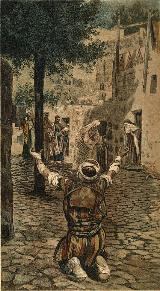I know many words, O men, but today you must kneel--
Your knees are your wings.
Your knees are your wings.
A leper comes to Jesus and begs him for help. He falls to his knees before him and says: "If you will, you can make me clean." (Mark 1.40)
The bodily gesture itself is the bearer of the spiritual meaning, which is precisely that of worship. Without the worship, the bodily gesture would be meaningless, while the spiritual act must of its very nature, because of the psychosomatic unity of man, express itself in the bodily gesture. The two aspects are united in the one word, because in a very profound way they belong together. When kneeling becomes merely external, a merely physical act, it becomes meaningless.

On the other hand, when someone tries to take worship back into the purely spiritual realm and refuses to give it embodied form, the act of worship evaporates, for what is purely spiritual is inappropriate to the nature of man. Worship is one of those fundamental acts that affect the whole man. That is why bending the knee before the presence of the living God is something we cannot abandon.

On the other hand, when someone tries to take worship back into the purely spiritual realm and refuses to give it embodied form, the act of worship evaporates, for what is purely spiritual is inappropriate to the nature of man. Worship is one of those fundamental acts that affect the whole man. That is why bending the knee before the presence of the living God is something we cannot abandon.
Again, there is a story that comes from the sayings of the Desert Fathers, according to which the devil was compelled by God to show himself to a certain Abba Apollo. He looked black and ugly, with frighteningly thin limbs, but most strikingly, he had no knees. The inability to kneel is seen as the very essence of the diabolical.
--Joseph Ratzinger (Pope Benedict XVI), The Spirit of the Liturgy (189-93)

I [...] fell upon my knees and spread out my hands to the Lord my God.
--Ezra 9.5













